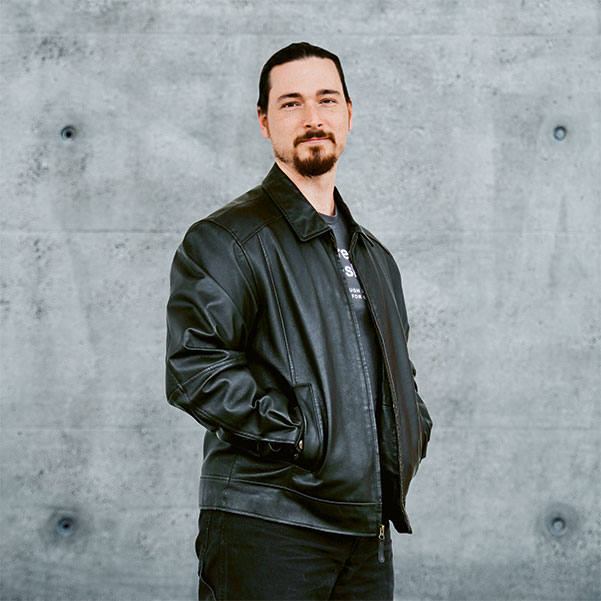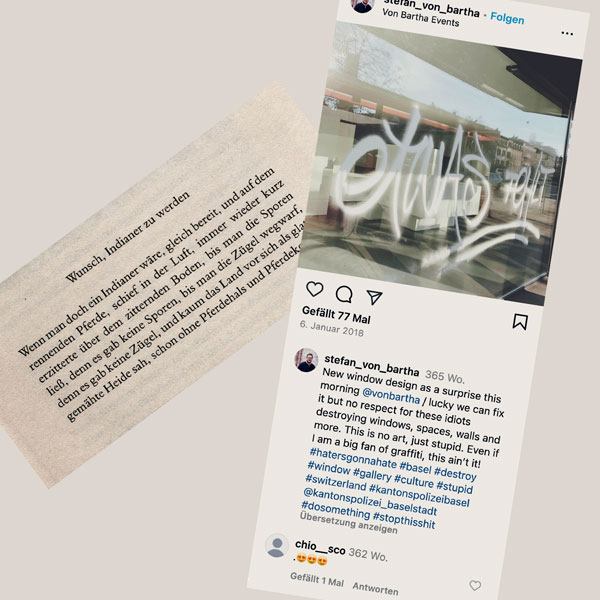Is it a human right to biohack yourself?
Across the world, biohackers are testing their genetic methods on themselves. Should we be allowed to change our own genome?

Image: Abbey Goldman (photomontage)
My experiments are in the field of genetics. I’ve been working for years now to cure genetic diseases in dogs, but I’ve also been working on myself. I’ve temporarily added new genes to a handful of my own cells inside my body in preparation for something more meaningful.
I’m a biohacker. I alter genes in the lab I’ve built at home. I’m going to be altering a few of my genes. The first will largely be a replication of a clinical trial done at Ohio State University in 2008 where extra copies of the human follistatin gene were introduced into patients with muscular dystrophy. This genetic alteration causes a rise in muscle mass and a drop in body fat. In mice, it even increases life expectancy by 15 percent. That’s a very well documented, well-proven genetic edit. I’m doing it because I want it for myself. It’s even commercially available now for around one million dollars for billionaire medical tourists. I won’t be spending a million dollars to do it myself.
Biohackers are a loose global community of people who believe that genetics technology and the like belong to everyone equally. That’s why we work open source. We share everything with the world – all our successes and all our failures. The idea is that the purest science and engineering should be the most transparent and the most open to participation.
We all own ourselves. Our bodies and our genomes are ours alone. No one has the right to tell us what our genes should be. Bodily autonomy is a basic human right, and the individual genome itself may be the most personal thing it’s possible to own. There may be no right more fundamental to human freedom than the right to be what we choose to be, all the way down to the molecular level.
It’s easy to dismiss this as a right because no one’s had it before. I would argue that we’ve always had the right, just not the ability. Now that gene-editing technologies like CRISPR are making this an ability we can all possess, we have to address the fact that every person has the right to control their own genome.
There are risks, but those risks are only to me, and so they are mine to take. It’s a free choice available to any free person. And I’m not the only one. Many people are looking to change things about themselves with this technology. Some have genetic diseases and are running out of time. In the absence of a cure they’ve elected to be their own heroes. Some simply have the desire to make their genes what they choose. All are working to refine the techniques and make the technology more usable, less expensive and safer.
It’s critical, though, that people aren’t denied this basic human right. To deny someone control of their own genome would be to assert ownership of them in the most basic and fundamental way possible. You wouldn’t just be claiming to own their bodies, but you’d be claiming to own who they are, and that’s a dangerous road to walk down.
This is a new ability for humanity, and its implications for the future are immense and beautiful. I look forward to a more diverse and healthier humanity, where our genetics become a function of choice and not just chance. The question was never really about whether people should be allowed to change their own genes. The question is about who has the gall to claim ownership over the genes of others. Or, as I prefer to put it: now that you have the choice, what genes do you want?
David Ishee is a biohacker from Mississippi (USA) and the owner of the dog breeding company Midgard Mastiffs.

Image: Manu Friederich
Do-it-yourself gene therapies are a logical consequence of the direct-to-consumer gene tests that were established successfully a few years ago. If you’re allowed to make a private diagnosis, so the argument goes, then you should also be able to administer a therapy. The deficiencies inherent in humankind were already a matter of interest to Plato, many centuries ago. The age-old dream of being able to overcome human shortcomings was then pursued on a grand scale in the political eugenics programmes of technocrats in the USA, under Stalin and in Hitler’s Germany. Eugenics has been frowned upon since then, and so has hidden itself behind a different political slogan, namely ‘self-enhancement’. The first syllable ‘eu’ in ‘eugenics’ comes from the Greek meaning ‘good’. When put together with the prefix ‘self’, it implies that biotechnology can now provide us with the means to realise a ‘better’ self of our own choosing. Our liberal society then promptly declares this to be a matter of merely private concern, and one which should thus remain free of external interference.
The liberation rhetoric of modern biotechnology has already been unmasked by Michel Foucault as an internalisation of the political-economic policy to constantly seek increased efficiency. It is not so much the yearning for improvement that is naïve here, but the insistence that this desire is both voluntary and authentic. In fact, it’s really a kind of ‘genetic correctness’ that can be studied pertinently in the decisions that have been made about pre-implantation genetic diagnoses and prenatal diagnostics. Biohacking might like to see itself as subversive, although in fact it merely offers an adventurous variation of the self-discipline recommended by today’s general health policy.
But there’s something about the liberal genetic credo surrounding the freedom to self-manipulate that doesn’t quite add up. It ends in grief when it collides with real social circumstances, as we can see in the never-ending doping scandals in sports. This DIY ego stands in contradiction to the democratic principles of justice and fairness. There’s also the question as to who will have to compensate for the negative consequences of self-manipulation. To place the burden on our social and health systems would be logical in a hard-core capitalist world where profits are privatised and losses are socialised, but it would ruin the welfare state. The only people likely to believe the notion that you can combat disease by DIY means are those same people who have already written off all forms of solidarity as being bankrupt. We only need to look at the original genetic act, i.e., reproduction, to recall that we know neither whether genetic manipulations to parents impact their children, nor, if so, to what extent. In this sense, it becomes clear that the ‘self-’ in ‘self-enhancement’ and ‘self-manipulation’ is founded on a fatal self-deception.
Ironically, the company Open Discovery Institute, which provides biohackers with their genetic tools, goes by the acronym ‘The Odin’ – after the Germanic paternal god, also known as Wotan, the god of war and death. ‘Playing God’ will always fail, not least in this modern variant that supposedly aspires to democratise divine fantasy.
Frank Mathwig is a theologian and ethicist who works for the Swiss Association of Protestant Churches and at the University of Bern. He is a member of the National Advisory Commission on Biomedical Ethics.

Image: Valérie Chételat
People have always experimented on themselves. Across civilisations, humans have long tried out different foods and diets, plants with medicinal properties, ways of living, rituals, etc. Exploring and understanding the world initially depended on self-experimentation – and rather heavily, too. As knowledge production became more organised and professional, scientific norms and standards emerged that enclosed most experiments within institutional boundaries. Even in such settings, however, researchers continued to self-experiment. The history of science is studded with anecdotes and recorded cases of researchers testing their ideas, theories and devices on themselves first. Biomedicine in particular offers several fascinating examples including that of Barry Marshall, who ingested helicobacter pylori bacteria to test his hypothesis that they caused ulcers. Eventually Marshall and his colleague Robin Warren were awarded the 2005 Nobel Prize in physiology and medicine for their discovery. To be sure, not every attempt at self-experimentation is guaranteed such a glorious outcome. What’s more, such experiments can be harmful to those who undertake them. We are not at ease with a high risk of self-harm, and in many areas of life we try to avoid and prevent this. So, is the risk of self-harm sufficient to justify prohibiting self-experimentation?
A general ban on self-experimentation would be unjustified; it would also be largely unenforceable. As autonomous competent agents, individuals are entitled to take risks, provided that they do not conduct illegal activities. People choose to pursue extreme sports, for example, which requires excessive, potentially harmful training and entails the risk of lethal accidents. While most of us would rather not take such risks, we should not be in a position to dictate to others a degree of risk that they may or may not take, especially when the purpose of their action is highly valued. We rely on safety standards, training, information and other means to help people make better decisions about risk when they wish to pursue valuable goals. Setting limits on individual freedoms requires a strong justification. For example, there might be forms of self-experimentation that can be ethically problematic, such as experiments that may cause harm to others – the use of an infectious agent, for example. Typically, access to such agents is regulated and controlled in similar ways as with other hazardous products. Devices and technologies that require safety standards and qualified users are also regulated through assorted consumer protection measures and other mechanisms. Existing prohibitions of harmful compounds on the grounds of public risk inevitably curb the most worrisome forms of self-experimentation.
Today, with increasing access to online information, the popularity of citizen science and bio-hacking, and the emergence of movements such as the quantified self, people are being presented with more opportunities to experiment on themselves. Communities of self-experimenters weigh up the risks and benefits, and have begun setting standards of ethical conduct for their experiments. If national legislators consider regulatory action against self-experimentation, it is important, beyond considerations of possible harm, that they take into account the social value of self-experimentation as an expression of our freedom to pursue valuable goals.
Effy Vayena is a full professor in bioethics at the Institute of Translational Medicine at ETH Zurich.




